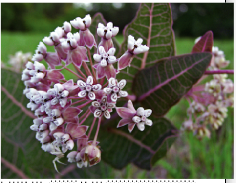Florida native plants for sustainable landscapes.
Visit PlantRealFlorida.org
 Beautiful but difficult to propagate: Asclepias humistrata
Beautiful but difficult to propagate: Asclepias humistrataThe following information provided by Jaret C. Daniels, Ph.D., Assistant Curator of Lepidoptera, University of Florida IFAS Assistant Professor of Entomology, Florida Museum of Natural History
Every year as fall approaches, millions of monarch butterflies throughout eastern North America make their long-distance journey south to the mountains of central Mexico to overwinter. In Florida, we also have small resident populations that breed year-round in southern portions of the state. Many butterfly enthusiasts and gardeners plant milkweed in their landscapes to help provide needed food for monarch larvae.
Unfortunately, not all milkweeds are the same. Non-native Tropical Milkweed (Asclepias currasivica), by far the most common commercially available species and sometimes misidentified in the marketplace as native, has escaped from cultivation in many areas and can cause some problems for Monarchs. Because Tropical Milkweed grows throughout the year (weather permitting), it can enable monarchs to continue breeding well into the fall or winter, disrupting their normal migratory cycle. Prolonged breeding can also foster higher than normal infection rates by a lethal protozoan parasite, Ophryocystis elektroscirrha, or OE for short. In fact, recent research indicates that such year-round resources could prolong exposure to parasites, elevate infection prevalence, and even favor more virulent parasite genotypes.
The simple answer to this potential problem is “go native.” An abundant and diverse supply of native milkweed species will contribute to a an abundant healthy population of monarch butterflies. The challenge is finding one of our many native milkweed species in nursery production. [FANN growers offer Scarlet or Swamp Milkweed (Asclepias incarnata), Aquatic or White Milkweed (A. perennis) and Butterflyweed (A. tuberosa) in small quantities – usually, hundreds or less.]
The Florida Museum of Natural History and the Butterfly Conservation Initiative are trying to help by growing several milkweeds including Asclepias perennis, A. incarnata, A. humistrata and A. lanceolata for eventual retail sale as well as developing appropriate nursery propagation protocols. This effort complements the excellent work of the Xerces Society for Invertebrate Conservation to increase the availability of Florida native milkweed seed for monarch butterfly habitat restoration efforts. Finally, our three organizations are developing an informational brochure that emphasizes the importance of using native milkweed, features several Florida milkweed species and provides color photos of common butterfly larvae and their native Florida host plants. We hope to raise awareness and interest in using native plants in the landscape and help stimulate more native milkweed production. Look for the new brochure as a companion to the Florida Wildflowers & Butterflies brochure in early 2012. Also see: http://www.flmnh.ufl.edu/wildflower/books.asp
About Milkweed Seed
The following information provided by Brianna Borders, Plant Ecologist with the Xerces Society for Invertebrate Conservation.
Commercial sources of Florida native milkweed seed are even more scarce than plants. This can make it difficult to include milkweed in budget-challenged regional restoration efforts. The Xerces Society for Invertebrate Conservation is working with the Natural Resources Conservation Service (NRCS) Plant Materials Center in Brooksville, to increase the availability of Florida native milkweed seed for monarch butterfly habitat restoration efforts. In winter 2011, Xerces and the Plant Materials Center will initiate seed production of Pinewoods Milkweed (Asclepias humistrata) and Aquatic Milkweed (A. perennis). The seed produced will be transferred to private native seed producers for commercial-scale production. Xerces contracted with Oecohort, LLC to wild-collect the seed stock used to initiate this seed increase program.